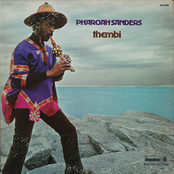Thembi

Biography
Thembi is a 1971 album by free-jazz saxophonist Pharoah Sanders. In this album, named after Sanders's son, the saxophonist moved away from the intense, lengthy, percussion-heavy jams he'd been pursuing in his solo work up to that point, and produced a record made up of shorter tracks, often with a more light and breezy feel. During the six selections, he and the other musicians play a huge variety of instruments - he alone plays tenor, alto and soprano sax, alto flute, fifes, bailophone (Africa...
Thembi is a 1971 album by free-jazz saxophonist Pharoah Sanders. In this album, named after Sanders's son, the saxophonist moved away from the intense, lengthy, percussion-heavy jams he'd been pursuing in his solo work up to that point, and produced a record made up of shorter tracks, often with a more light and breezy feel. During the six selections, he and the other musicians play a huge variety of instruments - he alone plays tenor, alto and soprano sax, alto flute, fifes, bailophone (African thumb piano), various small percussion instruments, and even a cow horn. This adds to the air of typical 1970s avant-garde jazz experimentation, which gives rather an eccentric, if intriguing effect (on one track Cecil McBee is credited with 'bird whistles'!) 'Thembi' could be described as an anomaly in his output from this period due to shorter, more concise tracks, and the fact that there is much less of the leader's trademark free jazz tenor sax screaming than previously (though, to be fair, his previous works did have long, lyrical sections). About the only track where he really seems to let rip is "Red, Black and Green", where the use of studio effects gives a fearsome effect, and the energetic, tribal "Bailophone Dance". Vocalist Leon Thomas, whose yodelling and crooning contributed so much to Sanders' best-known album, Karma, is not present, but we do hear Sanders' other major collaborator, pianist and composer Lonnie Liston Smith (though this would be the last time they recorded together). His presence is a major factor in tracks such as 'Astral Travelling' and 'Morning Prayer.' Also featured are violinist Michael White, bassist Cecil McBeee (he contributes a five-minute solo, 'Love'), and percussionists Chief Bey, Majid Shabbaz, and Nat Bettis. The album has yielded up a fair number of Sanders' most popular tracks: 'Thembi', 'Astral Travelling' and 'Morning Prayer' were all included on the recent two-disc Sanders career retrospective anthology, "You've Got to Have Freedom," on Soul Brother records. 'Thembi' has been criticised for its somewhat cut-and-paste feel (it was compiled from two sessions, recorded in 1970 and 1971); the Penguin Guide to Jazz on CD, edited by Richard Cook and Brian Morton, offers a particularly harsh assessment. However, Ashley Khan, author of 'The House that Trane Built: The Story of Impusle Records', describes it as "a career high-point: [it was] co-produced by Michel and rock producer Bill Szymczyk, who together introduced Sanders’s music to advanced studio techniques of the day — close miking, overdubbing, and effects like reverb, echo, and phasing." [see http://www.vervemusicgroup.com/product.aspx?ob=m&src=art&pid=11534] Though very much of its time, the album is full of attractive playing and musical ideas, and is one of Sanders' most accessible. [edit] Track listing 1. Astral Travelling (5:48) 2. Red, Black & Green (8:56) 3. Thembi (7:02) 4. Love (5:12) 5. Morning Prayer (9:11) 6. Bailophone Dance (5:43) [edit] Personnel and Recording Details Tracks 1-4 recorded at The Record Plant, Los Angeles, CA, November 25, 1970. Track 4 is an unaccompanied bass solo. Pharoah Sanders (tenor sax, soprano sax, bells, percussion) Michael White (violin, percussion) Lonnie Liston Smith (piano, electric piano, claves, percussion) Cecil McBee (bass, finger cymbal, percussion) Clifford Jarvis (drums, maracas, bells, percussion) James Jordan (ring cymbal -3) Tracks 5-6 recorded at the Record Plant, New York City, January 12, 1971. Pharoah Sanders (tenor sax, alto flute, koto, brass bells, balaphone, maracas, cow horn, fifes) Lonnie Liston Smith (piano, ring cymbal, shouts, balaphone) Cecil McBee (bass, bird effects) Roy Haynes (drums) Nat Bettis, Chief Bey, Majid Shabazz, Anthony Wiles (African percussion) [edit] Original Liner Notes by Keorapetse Kgositsile PRO/CREATION (for Pharoah Sanders) Music, as language, looking in to the world with the spirit of a people, identifies itself more precisely than label. And is there, always, coming from every place Pharoah has been--Africa, Asia, & our long memory in America He, traveler in sound/spirit, is direction firm, strong, firmly connected to root. Expression past any word. Energies of sound, old as ear of any god known or not, now redistributed here to move us with Love, Morning Prayer, Evening Prayer Continuities, yes, the song, memorial and now. It is from here Pharoah takes our ear breaking the silences of our spirit & walls. Remember slave bells? And desire? Red, Black & Green: THEMBI, the woman, home. Read more on Last.fm. User-contributed text is available under the Creative Commons By-SA License; additional terms may apply.

